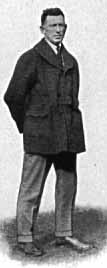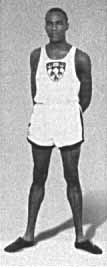A New Chapter for McGill
There's a good chance McGill will outsource the operation of the McGill Bookstore, located in its new building on McTavish Street. After a fall of raucous debate on campus, The Board of Governors is expected to make the final decision at its November 24th meeting.
 In recent months, the whole issue has caused a hullaballoo on campus. Some ask why McGill can't run its own bookstore, already a profitable operation ($400,000 to $500,000 per year). The answer, it seems, is there's more money to be made. In recent months, the whole issue has caused a hullaballoo on campus. Some ask why McGill can't run its own bookstore, already a profitable operation ($400,000 to $500,000 per year). The answer, it seems, is there's more money to be made.
Last year, Vice-Principal (Finance) Phyllis Heaphy paid $35,000 to the accounting firm Samson Bélair Deloitte & Touche to study bids. While proposals rolled in from big American book chains like Follett and Barnes and Noble, a special committee struck by Heaphy recommended awarding the contract to Chapters Inc., the Goliath of the Canadian retail book business.
Proponents say Chapters gives readers good selection and prices, and cozy furniture for book ogling. Others liken Chapters to a WalMart-style cultural monopoly and point to reports of industry bullying by Chapters President - and former Canadian 21st Airborne Division Lieutenant - Larry Stevenson.
Yet Chapters claims it will increase profits and allow McGill to pay down the $4.5 million bookstore mortgage even faster. Chapters guarantees that the 32 Bookstore employees will remain McGill employees. The megastores are usually coupled with Starbucks cafés, but no word yet on whether current staff will be asking, "Do you want a double moka decaf with that copy of Kafka's Metamorphosis?"
|
Best of the Class
There is a famous face in McGill's first-year civil law program this year. Audrey Best, the wife of Quebec Premier Lucien Bouchard, is studying civil law in the part-time program including a course on constitutional law. The Californian-born mother of two spent last year doing a qualifying year before her admittance this fall.
|
Is that pot, or pat, or pet?
 Canadians, you have a special way around the English language. Or so says McGill professor Heather Goad, who is studying pronunciation particularities among Torontonians, Montrealers and Windsorites. The McGill linguist posted notices last September calling for students from these three cities to participate in a study on vowels, seeking to discover if the sounds a and o are following the American trend to "shift vowels forward." Canadians, you have a special way around the English language. Or so says McGill professor Heather Goad, who is studying pronunciation particularities among Torontonians, Montrealers and Windsorites. The McGill linguist posted notices last September calling for students from these three cities to participate in a study on vowels, seeking to discover if the sounds a and o are following the American trend to "shift vowels forward."
Known as "low vowels" (because of where they're formed in the mouth), some American dialects now pronounce o and a differently than before. For instance, pot sounds closer to pat, and pat now sounds closer to pet. Goad and researchers Julie Auger and Bridget Haugh, BA'97, hypothesize that any changes toward the American trend will be more pronounced in Windsor - with its closeness to the U.S. border - and in Toronto, because "major metropolitan cities tend to lead trends." Montreal's diminishing English community, on the other hand, might react like a small village and resist outside influence, she anticipates.
Because there's no research funding for this project, her participants forego payment and receive a ticket of hope for 30 minutes of participation - a Quebec lottery ticket.
|
Cheques from Czechs
Who says world events don't impinge on McGill? The floods in the Czech Republic last summer also wiped out the first-year Czech course. For the last few years Montreal's Czech community had contributed to funding Czech instruction at McGill. But given the severity of the flood, the Czech community leaders felt, quite understandably, that the money had to go to emergency relief instead. They hope to resume funding next year.
|
Hairnets for students
 Pity the poor students from the Student Organization for Alumni Relations (SOAR). During orientation week, they attempted to hold a hot dog roast on the lower campus in order to make a little money and introduce their organization to the students. That was until inspectors from the Montreal Health Department swooped in and demanded that students wear hair nets. No such fashion trend ensued. According to our sources, the health zealots left campus after a polite conversation with some persuasive members of Facilities Management. Pity the poor students from the Student Organization for Alumni Relations (SOAR). During orientation week, they attempted to hold a hot dog roast on the lower campus in order to make a little money and introduce their organization to the students. That was until inspectors from the Montreal Health Department swooped in and demanded that students wear hair nets. No such fashion trend ensued. According to our sources, the health zealots left campus after a polite conversation with some persuasive members of Facilities Management.
|
Would he or wouldn't he?
 That was the question concerning famed neurologist Oliver Sacks at a small dinner before delivering the Beatty Memorial Lecture last October. Sacks had recently written a New Yorker article about meat viruses. So what would he do with plate of chicken in mushroom sauce served up at the McGill Faculty Club? Indeed, Sacks finished his supper, retiring early to prepare his speech "Neurology and the Soul," which he delivered to a sell-out audience of 650. The neurologist and author is best known for his book Awakenings, which was turned into a Hollywood film. That was the question concerning famed neurologist Oliver Sacks at a small dinner before delivering the Beatty Memorial Lecture last October. Sacks had recently written a New Yorker article about meat viruses. So what would he do with plate of chicken in mushroom sauce served up at the McGill Faculty Club? Indeed, Sacks finished his supper, retiring early to prepare his speech "Neurology and the Soul," which he delivered to a sell-out audience of 650. The neurologist and author is best known for his book Awakenings, which was turned into a Hollywood film.
|
U2 Good News for McGill
The arrival of U2's Popmart tour in Montreal was good news for McGill - by domino effect. When the Irish rock group played the Olympic Stadium on November 2, the Montreal Alouettes football team had to find a new venue for their playoff game. McGill offered Molson Stadium free of charge. In turn, the Alouettes spent $55,000 to help fix the stadium, repairing press boxes and any broken seat planks. The crumbling stadium is in need of $6 million in repairs. Now if the Alouettes would only play there another 99 times...

Greek ruins or Molson Stadium? A worker ensures that spectators would not be lost between the cracks at the Montreal Alouettes playoff game on November 2. The game drew 16,000 fans - the best crowd of the Alouettes' season. The team recently announced that Molson Stadium will be the home of the Alouettes next year.
Photo: Cliff Skarstedt
|
Recruitment heats up
If we hold classes, they will come. For years, that was McGill's philosophy toward student recruitment as the best and brightest naturally found their way to McGill. Today, with fewer 18-year-olds in the North American population, the University is using new marketing strategies to compete for accomplished high school seniors. Last February, McGill opened a new Recruitment and Liaison Office. Led by Anne Roussell, it is using the personal touch: phone calls to newly-accepted students from professors, students, and alumni, ad campaigns, appearances at college fairs around the world, and send-off parties for accepted students hosted by alumni.
The aim is to attract a healthy contingent of diverse students which will continue to give McGill its defining characteristic as the most national and international university in Canada. "I want to band together with other Canadian universities and take a 'Team Canada' approach to international recruitment," says Roussell. McGill has increased the number and amounts of scholarships and levels of student assistance. For the first time in many years, all first-year out-of-town students were offered a place in residence in order to help sway their decision. Prospective students (or their parents) can call (514) 398-4751 for information about McGill.
|

Frank Shaugnessy |
Sports Hall of Fame
McGill named a new contingent to its Sports Hall of Fame at a special luncheon held last September (in addition to the earlier named Gladys Bean, BA'40, DPhe'41, [1918 - 1986] and Jack Gélineau, BCom'49, Summer'97).
Inductees were: Dr. Bobby Bell, BA'26, DDS'28 [1903-1948], the winningest hockey coach in McGill history; Dr. Phil Edwards, MD'36, GDip'45 [1907-1971], who won five Olympic bronze medals while representing Canada at the 1928 Amsterdam Games, the 1932 Los Angeles Games, and the 1936 Berlin Games; Dr. Cyril "Flin" Flanagan, DDS'23 [1897-1994], who excelled at football and hockey and even refused a $4,000 offer from the Montreal Canadiens in 1922, saying it was wrong to take money for sport; Frank "Shag" Shaughnessy [1884-1969], who coached Redmen football to a 32-52-4 record over 15 seasons and introduced the forward pass to Canadian football. He also coached men's and women's hockey. The 1945-46 Redmen Hockey Team took the team award. The team was the last to win a Canadian hockey championship for McGill.
|

Dr. Phil Edwards |
Donations Up
 For the 1996-97 year, McGill raised more money in donations than ever before - $44, 807,473. Most of the donations - some 48 percent - came from the Montreal region. Another 30 percent came from Canada, 11 percent from the United States, and 10 percent internationally. The Alma Mater Fund had an excellent year, realizing more than $4 million from alumni. Bequests - the fastest growing area of donations - brought $7, 217, 673 to McGill. For the 1996-97 year, McGill raised more money in donations than ever before - $44, 807,473. Most of the donations - some 48 percent - came from the Montreal region. Another 30 percent came from Canada, 11 percent from the United States, and 10 percent internationally. The Alma Mater Fund had an excellent year, realizing more than $4 million from alumni. Bequests - the fastest growing area of donations - brought $7, 217, 673 to McGill.
|
|